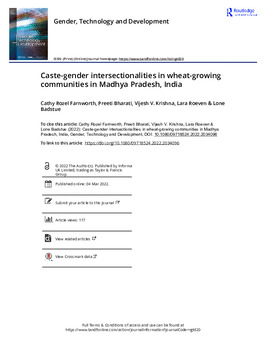Mostrar el registro sencillo del ítem
Caste-gender intersectionalities in wheat-growing communities in Madhya Pradesh, India
| Creador: | Farnworth, C.R. |
| Creador: | Bharati, P. |
| Creador: | Krishna, V.V. |
| Creador: | Roeven, L. |
| Creador: | Badstue, L.B. |
| Año: | 2022 |
| URI: | https://hdl.handle.net/10883/22024 |
| Lenguaje: | English |
| Editor: | Taylor & Francis |
| Copyright: | CIMMYT manages Intellectual Assets as International Public Goods. The user is free to download, print, store and share this work. In case you want to translate or create any other derivative work and share or distribute such translation/derivative work, please contact CIMMYT-Knowledge-Center@cgiar.org indicating the work you want to use and the kind of use you intend; CIMMYT will contact you with the suitable license for that purpose |
| Tipo: | Article |
| País de enfoque: | India |
| Lugar de publicación: | United Kingdom |
| Páginas: | 28-57 |
| Número: | 1 |
| Volumen: | 26 |
| DOI: | 10.1080/09718524.2022.2034096 |
| Palabras Claves: | Intersectionality |
| Palabras Claves: | Caste |
| Palabras Claves: | Feminization of Agriculture |
| Descripción: | This article addresses the patterns of women’s engagement in wheat as decision-makers and laborers in India. Qualitative research conducted twice in one village in Madhya Pradesh explored gender norms and agency changes over time. Quantitative research was carried out in the same village and 17 additional villages. Four questions are asked: (1) Is decision-making in wheat feminized? (2) Is labor in wheat feminized? (3) In what ways do interactions between caste and gender determine and limit the spaces within which women can act? (4) In what ways are women challenging their gender and caste identities to enhance their livelihoods by influencing their roles, responsibilities, and decision-making in wheat? The findings show that only a few women consider themselves “farmers” and participate actively in discussions around wheat. Over the last decade, women of all castes have been employed as laborers in wheat, driven by aspirations to improve their lives. Women also fund the wheat system through self-help groups. However, their participation in the labor force is threatened by agricultural mechanization. A strong, positive association was observed between women’s agency in crop production and their agency in household expenditures. |
| Agrovoc: | CASTE SYSTEMS |
| Agrovoc: | GENDER |
| Agrovoc: | WHEAT |
| Agrovoc: | WOMEN'S EMPOWERMENT |
| Datasets relacionados: | https://www.tandfonline.com/doi/figure/10.1080/09718524.2022.2034096?scroll=top&needAccess=true |
| ISSN: | 0971-8524 |
| Revista: | Gender, Technology and Development |
Ficheros en el ítem
Este ítem aparece en la(s) siguiente(s) colección(ones)
-
Socioeconomics
Including topics such as farming systems, markets, impact & targeting, innovations, and GIS

